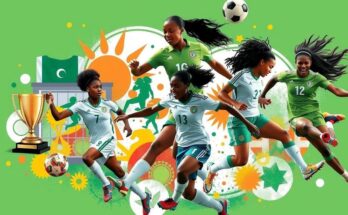Several talented Nigerian track and field athletes, including Annette Echikunwoke and Salwa Eid Naser, have switched nationalities in pursuit of success after facing challenges with the Athletic Federation of Nigeria. Their stories reflect a broader discontent within Nigerian sports, underscoring the impact of inadequate support from local federations.
A wave of discontent has risen among talented Nigerians in track and field, leading several athletes to switch their allegiance to other nations in pursuit of better opportunities and recognition. This trend comes to light with Favour Ofili’s recent announcement regarding Turkey, prompting a deeper look into the paths taken by other athletes facing similar frustrations with the Athletic Federation of Nigeria (AFN).
Annette Echikunwoke, an accomplished hammer thrower, showcases the impact of these decisions. Echikunwoke, born to Nigerian parents in Ohio, initially represented Nigeria but switched to the USA after being disqualified from the 2020 Tokyo Olympics due to AFN’s failure to conduct drug tests. Her notable achievements include winning silver at the 2024 Olympics and setting the African record at 75.49m while still competing for Nigeria. Transitioning to the United States, she made history, further shedding light on the struggles faced by Nigerian athletes amid administrative negligence.
Salwa Eid Naser, originally Ebelechukwu Agbapuonwu, represents Bahrain. Born in Nigeria and moving to Bahrain before her teen years, she became the 2019 World 400m champion and has clocked one of the fastest times ever. Switching in 2014, she converted to Islam and adopted a new name. Reflecting on her decision after years of adaptation, she noted that the “past three years have been a great transition.” This indicates the varied motivations for those leaving Nigeria for greener pastures.
Femi Ogunode’s experience further highlights the discontent. Ogunode, who previously held the Asian 100m record, struggled to compete for Nigeria despite qualifying for key events in 2007 and 2008. Following that disappointment, he accepted Qatar’s invitation to represent them, becoming a dual gold medalist at the 2010 Asian Games. His switch and subsequent success emphasize the attractions of international representation when local opportunities falter.
Another notable figure is Francis Obikwelu, who found success competing for Portugal. He clinched an Olympic silver in the 100m at the 2004 Athens Games and carried a European record for years. The AFN’s lack of support during the 2000 Sydney Olympics led him to make the difficult decision to represent another nation. He expressed the frustration dealing with the federation, yet stated, “I bear no grudge against anyone and Nigeria still remains my country.”
In the realm of hurdles, Glory Alozie’s shift to Spain reflects a bold move, motivated by youthful ambition and pressure. Her decision came in 2001, but her apology to Nigeria later suggests a recognition of the choices made. She expressed remorse, stating, “I didn’t really know the implication of that action until much later,” indicating the internal conflict many athletes face in this arena.
Daniel Igali, a wrestling champion who switched to Canada, epitomizes success under a foreign flag. After leaving Nigeria amid political turmoil, Igali won Olympic gold for Canada and later contributed to Nigerian wrestling’s development. His dual identity is a testament to the complex relationship athletes maintain with their home country while achieving global success.
Florence Ekpo-Umoh’s journey is another poignant example. The 400m sprinter left Nigeria in 1995 for a better situation in Germany. Over time, she thrived, achieving accolades including European Championship gold. Yet, she faced her own challenges, such as a suspension for doping. Her refusal to let her children represent Nigeria only underscores her disillusionment: “Never, Nigeria is even worse now.”
The trend of Nigerian athletes switching nationality is a complex mixture of personal aspirations, disappointment with the domestic sports administration, and the quest for international success. The stories of Echikunwoke, Naser, Ogunode, Obikwelu, Alozie, Igali, and Ekpo-Umoh provide a narrative that is both inspiring and disheartening, shedding light on the need for significant reform within the AFN to better support and retain talent.
The trend of Nigerian track and field athletes switching their national affiliations reflects not only personal aspirations but ongoing discontent with the Athletic Federation of Nigeria’s management. As athletes like Annette Echikunwoke and Salwa Eid Naser have demonstrated, the search for opportunity can lead to remarkable achievements abroad. However, it raises serious questions about how Nigeria can reform its systems to nurture and retain its homegrown talent.
Original Source: punchng.com




